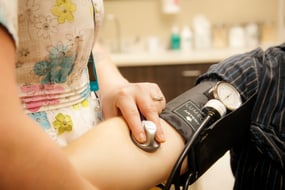Editor’s Note: This post was originally published on October 31, 2018 and has been recently updated to include the latest insights and best practices.
It’s widely accepted knowledge that regular medical visits are a critical part of improving or maintaining your ideal overall health. While the type and frequency of tests were previously dictated by age, conventional wisdom has changed. Research has shown that most of this general testing is unnecessary and could lead to patients altogether avoiding the doctor. At Vera Whole Health, the makeup of your personal annual exam reflects your own health milestones based on a multitude of factors — not exclusively your age.
At Vera, your provider will evaluate the appropriateness of certain tests based on your personal and family health history, diet, current health, and results from your biometric screening. Recommendations for exams are based on your personal health profile and evidence-based research. Talk to your provider and find out what health milestones you should be screened for and get tips from your Vera Whole Health coach on lifestyle changes that lower your risk of developing certain chronic illnesses.
Many patients are generally healthy but have other risk factors, like smoking, that might increase the conditions we need to be on the lookout for.

Health Screenings for Women
Even though your annual doctor’s visit is different from what it may have been in the past, if you’re like most women, you probably still want to know when or if you need to receive standard tests. Remember that these are general guidelines. Talking openly with your provider is the best way to determine what’s right for you.
Pap Smear — In general, Pap smears are performed to look for the Human Papillomavirus (HPV) and cervical cancer and are not recommended until a female is 21 years of age. If your Pap smear is negative, the next one is not recommended for 3-5 years, depending on your age.
Pelvic Exam — A lot of women equate a pelvic exam with a Pap smear. Although typically done at the same time, the pelvic exam is the physical exam of the external and internal female reproductive organs. This can aide in determining any abnormalities of the uterus or ovaries.
Breast Exam — It may surprise you to know that by the time a cancerous lump can be felt in the breast, it has probably been there for several years. Putting emphasis on manual breast exams has been found to develop a false sense of security. Often, women think if a breast exam done by them or their provider is normal they do not need a mammogram. Overall, breast exams are not an effective way to screen for breast cancer, and mammograms are currently the preferred method to screen patients.
Mammogram — Mammograms are the standard of care for breast cancer screening. There is different guidance from good organizations about the best time to start and how often to be screened. There is broad agreement that all women between 50 and 75 need a mammogram at least every other year. The recommendation to start earlier depends on your personal family history and should be part of a conversation with your provider. That same conversation will help determine if other screening methods would be better for you.
Osteoporosis — Osteoporosis is a condition where the bones weaken, increasing the risk for fractures. Caucasian and Asian women are more prone to this condition. Screening is done via a Dexa Scan (a form of x-ray) and is recommended starting at age 65.
Health Screenings for Men
Prostate Cancer — Prostate cancer screening recommendations have recently changed. For men 55-69, it is recommended that a patient make an individual decision based on their risk factors and personal preference. The biggest risk factors are being of African-American race and family history. For screening, a blood test called the PSA (prostate specific antigen) is used.
Health Screening for Both Men & Women
STDs — Both men and women who are sexually active should be periodically screened for sexually transmitted diseases. Frequency and type of testing varies. It is dependent on several factors including: sex, age, and lifestyle choices. For example, Chlamydia is typically asymptomatic in females and is the leading cause of infertility. Therefore, it’s imperative to screen for this in young women.
Colon Cancer — Colon cancer is the third most diagnosed cause of cancer death for both sexes. All people, women and men, should have colon cancer screening starting at the age of 50. Initial screening may be recommended earlier if there is a family history. There are many methods to screen, from the less invasive stool tests, which must be done every 1-3 years, to the more invasive colonoscopy, which is good for 10 years if negative and there is no family history of colon cancer. Talk to your provider to determine the best method for you.
High Blood Pressure — Screening for high blood pressure (hypertension) should begin at age 18. If normal and an individual is not at an increased risk for hypertension, rechecking every 3-5 years is reasonable. After age 40, blood pressure should be checked annually, more often if abnormal.
Depression — Screening for depression is recommended annually in all adults. This can be accomplished with 2 general questions. Positive responses should prompt a more extensive interview.
Weight — If you’re like most people, your weight could be your greatest health risk. Surprisingly, weight issues are virtually ignored — even by health practitioners — until a serious problem arises. More than 3 out of 4 people are at an unhealthy weight, which significantly increases the risk of:
- Heart disease
- Cancer
- Arthritis
- Hypertension
- Diabetes
One of the great things about your Vera Whole Health clinic is that you have access to Vera health coaches who work with your doctor to help you lower your health risks. Vera health coaches can help you work toward healthier habits and choices. Additionally, they can help you set and reach your fitness goals. Preventive care goes a long way to keeping you healthy.
Where Do I Start?
Make an appointment at your Vera clinic today. Your provider can talk you through recommended tests based on your health profile and history. Plus, you can chat with a Vera health coach about ways to lower your risk factors for chronic illnesses that affect people of your age and background.
At Vera Whole Health, our coaches understand what it means to truly listen and fully embrace your concerns. They work alongside you and your provider to assist you in maintaining or achieving your best healthy lifestyle. Whatever the challenges —they’re here to assist along the way.
The best news? Vera health coaching is free to all Vera members. Our coaches are available to provide you with a reliable support system including personalizing your annual health screens that reflect your individual needs and provider recommendations.
Sign up
Join our email list to receive the latest open positions, Vera Careers news, and more.





